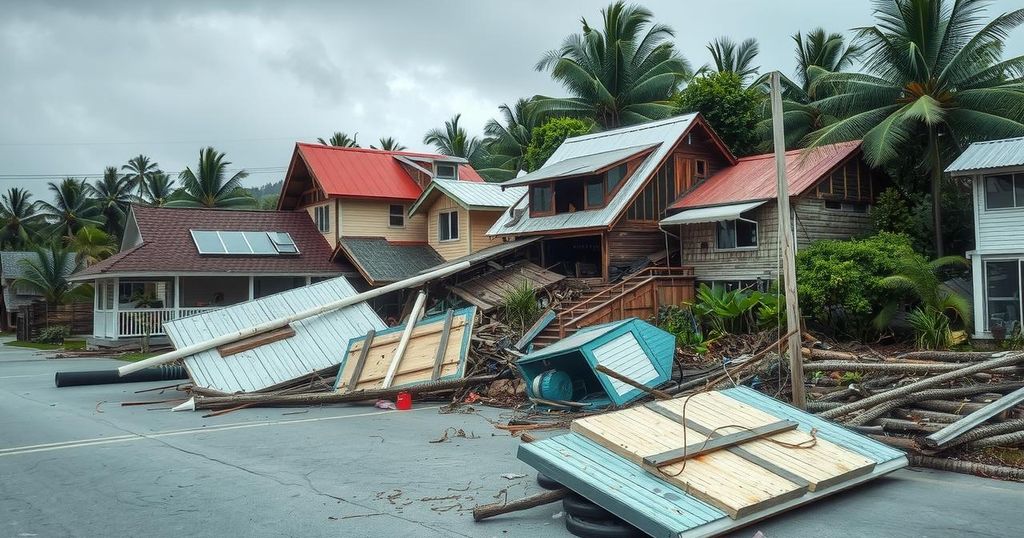Tropical Cyclone Chido struck Mayotte on December 14, with wind speeds exceeding 200 km/h, leading to significant destruction and loss of life. Despite timely warnings, the island, unaccustomed to such storms, suffered heavily. Chido also impacted Mozambique, and the role of climate change in its severity remains unclear, according to Météo-France. Upcoming cyclone seasons are predicted to have increased activity.
On December 14, Tropical Cyclone Chido struck Mayotte with wind speeds surpassing 200 kilometers per hour and gusts reaching over 225 kilometers per hour. This cyclone stands as the most intense storm to impact Mayotte in the last nine decades, as confirmed by Météo-France. Accompanying the fierce winds, the island experienced torrential rainfall totaling 176 millimeters in a brief 12-hour window, in addition to dangerous sea conditions with wave heights exceeding five meters. The cyclone’s magnitude was illustrated by the destruction of some of Météo-France’s observational structures.
In response to the disaster, French President Emmanuel Macron declared a period of national mourning. Initial reports indicate that hundreds of individuals may have lost their lives, highlighting the vulnerability of Mayotte, where many residents live in informal housing structures and are unaccustomed to such formidable cyclonic activity. Despite the accurate and timely warnings issued by Météo-France, which included an amber alert more than 50 hours prior, the loss of life remains significant. The warning system escalated from an amber alert early on December 13, to a red alert that evening, and then to a violet alert early on December 14.
Chido’s trajectory was particularly unusual, as it avoided Madagascar—which may have otherwise mitigated its strength—before categorically impacting Mayotte as an intense tropical cyclone. Following its landfall in Mayotte, Chido proceeded to affect Mozambique on December 15, where it weakened while continuing to bring heavy rainfall, extending its influence to Malawi.
Météo-France stated that the specific impact of climate change on this cyclone’s intensity and course remains undetermined. They noted, “The impacts of Chido are above all due to its track and the direct hit on Mayotte. This is an extremely rare event not seen for 90 years. Our current state of knowledge doesn’t allow us to draw any conclusions about the role of climate change on the track of the cyclone and on its intensity.”
Météo-France serves as the Regional Specialized Meteorological Centre (RSMC) for Tropical Cyclones in the South-West Indian Ocean, offering seasonal forecasts that accurately predicted an early onset of the 2024-2025 cyclone season, unlike previous years where impactful systems emerged in January. The outlook estimates that the upcoming cyclone season will likely involve near normal to above normal activity, anticipating nine to thirteen systems with four to seven expected to reach tropical cyclone stage.
Tropical cyclones represent serious natural disasters that can wreak havoc on small island nations like Mayotte. The region is particularly vulnerable due to its informal housing and lack of infrastructure built to withstand such severe weather. Tropical Cyclone Chido is significant not only due to its unprecedented strength but also because it underscores the challenges faced in early warning systems and disaster preparedness in the face of rapidly changing climatic conditions. The role of climate change in altering cyclone patterns and intensities is a subject of ongoing research, but accurate forecasting remains critical for minimizing loss of life and property.
The devastation caused by Tropical Cyclone Chido on Mayotte highlights the increasing vulnerability of regions unaccustomed to such severe tropical weather, especially in the wake of climate change. Despite timely warnings, the substantial loss of life and property reflects the urgent need for improved infrastructure and emergency preparedness. As forecasts continue to indicate potential for increased cyclone activity, particularly in the upcoming season, it is imperative for communities and governments to bolster their resilience against natural disasters.
Original Source: wmo.int






